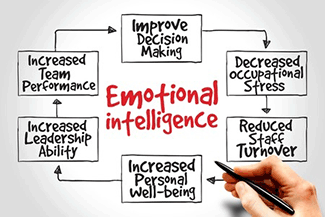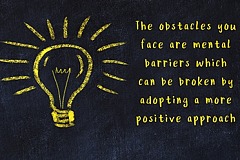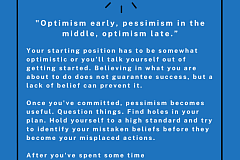 Emotional Intelligence (EI) is not a topic that an entrepreneur focuses on when launching a business. Rather, it is a good business concept and the resources to implement it that are considered most important. However, even when these factors are in place, why do some business ventures struggle to stay afloat while others thrive? The difference may be due to the soft skills or the emotional skills of the entrepreneurs leading these ventures.
Emotional Intelligence (EI) is not a topic that an entrepreneur focuses on when launching a business. Rather, it is a good business concept and the resources to implement it that are considered most important. However, even when these factors are in place, why do some business ventures struggle to stay afloat while others thrive? The difference may be due to the soft skills or the emotional skills of the entrepreneurs leading these ventures.
Entrepreneurs who are emotionally intelligent are adept at maintaining good morale in the workplace. They have good relations with customers and other stakeholders.
[quotesright]Seventy-One Percent of Employers Say They Value Emotional Intelligence over IQ[/quotesright] according to a CareerBuilder Survey of more than 2,600 hiring managers.
When asked why emotional intelligence is more important than high IQ, employers said (in order of importance):
- Employees (with high EI) are more likely to stay calm under pressure,
- Employees know how to resolve conflict effectively,
- Employees are empathetic to their team members and react accordingly,
- Employees lead by example, and
- Employees tend to make more thoughtful business decisions.
HR managers and hiring managers assess their candidates’ and employees’ EI by observing a variety of behaviors and qualities. The top responses from the survey were:
- They admit and learn from their mistakes,
- They can keep emotions in check and have thoughtful discussions on tough issues,
- They listen as much or more than they talk,
- They take criticism well, and
- They show grace under pressure.
What is Emotional Intelligence?
This concept became popular when author and psychologist Daniel Goleman published his book, "Emotional Intelligence" in 1995. It refers to the ability to be aware of and in control of one's own emotions. An emotionally intelligent person is also sensitive to the feelings of others.
[quotesright]Emotional skills are important in areas where traits other than mainly cognitive abilities are required to succeed. These skills are relevant when managing people or pursuing a personal goal. [/quotesright]
When researching the functions of global companies, Goleman noticed a link between emotional intelligence and effective business leadership. Among business leaders with comparable competencies, those who were emotionally sensitive produced better business results.
He identified four traits that we can work on to sharpen our emotional skills. They are self-awareness, self-regulation, empathy, and social skills. As an entrepreneur leading a business, you can benefit by cultivating these skills.
- Self-awareness. This is the most important trait of emotional intelligence. To develop self-awareness, start by noticing how you feel in a variety of situations. [quotesright] A high degree of self-awareness leads to identifying triggers that make you feel nervous, angry, or comfortable. [/quotesright] As you keep on practicing, you realize what your emotional strengths are and what areas you need to improve on. You become more confident at understanding the connection between your emotions and behavior.
- Self-regulation. Continuous practice of self-awareness leads to self-regulation. This is the ability to manage your emotions. You think of better ways of responding to emotional cues that lead to happier outcomes. As an entrepreneur, you [quotesright]respond in a way that is in keeping with your values rather than reacting impulsively. [/quotesright] You take responsibility for your emotions and how you behave. This is an important skill when consulting with and interacting with others.
- Empathy. While sympathy refers to feeling for others, empathy is an emotion that feels with others. If you are a business leader who has empathy, you can tune into how others feel emotionally. This is important when making key decisions relating to the business that require the concurrence of employees or others. A business manager or leader who cares to acknowledge the views of team members and act on such feedback makes an effort to practice empathy.
- Social skills. [quotesright]Most successful entrepreneurs have good social skills. [/quotesright] Good inter-personal skills stem from controlling one's own emotions and being able to tune into how others feel. Social skills also relate to effective communication skills, the ability to listen and respond appropriately. These skills are important when negotiating a business contract, making key decisions, resolving conflicts, or initiating change.
Emotional intelligence plays a key role in how you manage your feelings and respond to others. The traits relating to emotional intelligence must be practiced and developed over the long-term. Once mastered, these skills lead to happy relationships and effective business results. [quotesright]By developing and practicing good emotional skills, you have a better chance of seeing your businesses grow from strength to strength. [/quotesright]
How To Assess Emotional Intelligence
Are you able to assess an individual’s ability to sense, understand and effectively apply the power of emotional acumen to facilitate high levels of collaboration and productivity?
TTI’s research indicates that [quotesright]successful leaders and superior performers have well developed EQ skills.[/quotesright] This enables them to work well with a wide variety of people and respond effectively to the rapidly changing conditions in the business world.
EQ examines five key areas pertaining to intrapersonal and interpersonal relations:
- Self-Awareness,
- Self-Regulation,
- Motivation,
- Empathy, and
- Social Skills.
As coaches, we use this assessment tool and others to help team members understand themselves and others so productivity improves and conflict diminishes. We are backed by a TTI-trained team who work with us to ensure you get maximum value for your company. With high-impact and highly effective training programs, we help you bridge the divide between knowing and putting insights into practice in your organization. Let's talk, call now. USA: 877.433.6225 feedback@focalpointcoaching.com
Resources you can use:
- http://www.ttisuccessinsights.com/five-sciences/
- http://www.careerbuilder.com/share/aboutus/pressreleasesdetail.aspx?id=pr652&sd=8/18/2011&ed=08/18/2011
- http://www.danielgoleman.info/daniel-goleman-how-self-awareness-impacts-your-work/
- http://www.danielgoleman.info/topics/leadership/
- http://www.lifehack.org/articles/communication/7-practical-ways-improve-your-emotional-intelligence.html














